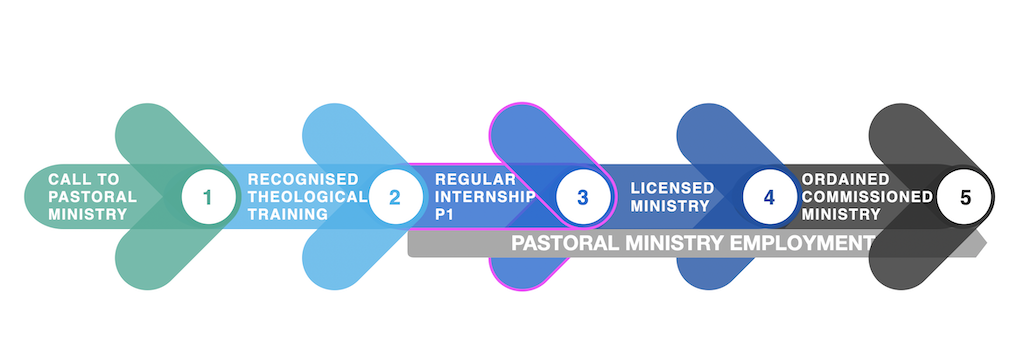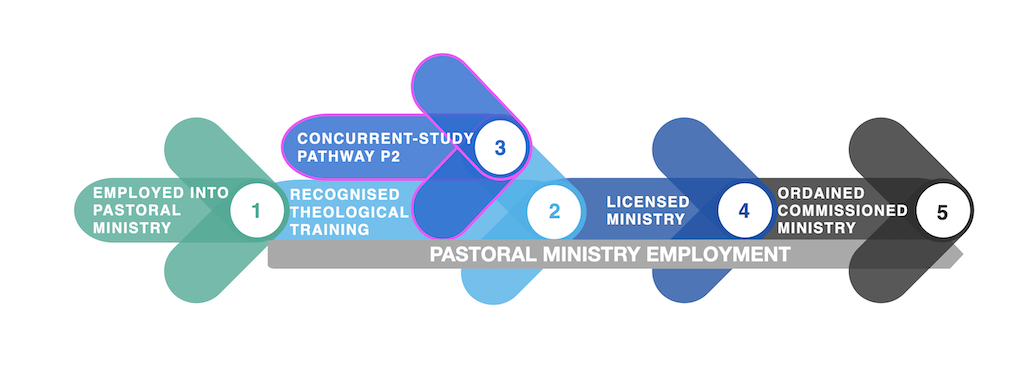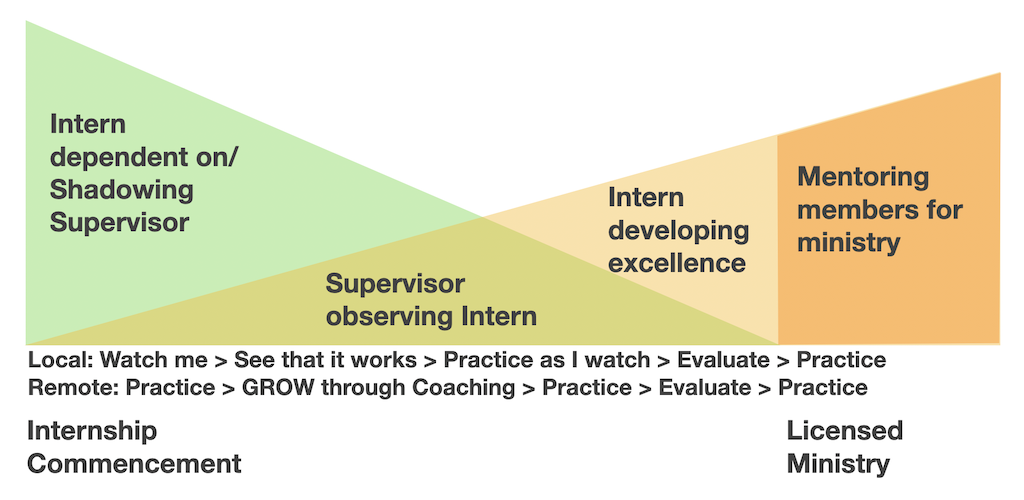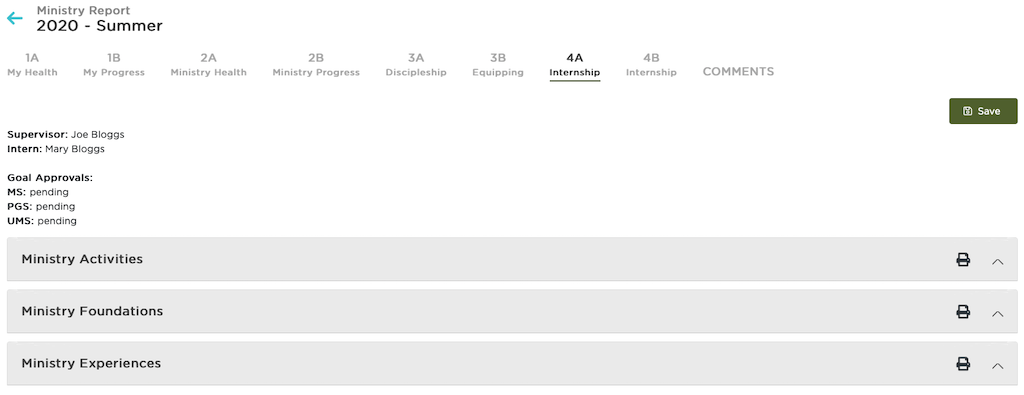Below is a short summary of the Ministry Progression Manual (DRAFT). The full text can be found at https://aucministerial.org/profile

WELCOME
PATHWAYS
SUPPORT
SUPERVISION
LEARNING
REPORTING
LICENSED MIN
ORD/COM
Glossary
THE GOAL OF INTERNSHIP
Internship is a supported journey designed to:
- Help Interns establish healthy rhythms and foundations for ministry life and practice that flow out of an abiding relationship with Christ;
- Provide experiences and opportunities to develop the Intern in character and competence;
- Help the Intern establish ministry competence in the following areas of ministry: building NEW connections, building belonging and a sense of FAMILY, SMALL group discipleship, LARGE group discipleship, and capacity as a LEADER.
Internship, together with the initial years of ministry prior to ordination or commissioning, should be considered a part of ministerial training. You will continue to grow in ministry competency throughout your ministry journey. Good habits established during this time will be vital to your ministry over the course of your life.
Further formal education beyond Internship should be negotiated with Conference leadership. For the complete SPD Internship Policy, see Appendix 9, SPD Working Policy Min 10.20.
TO THE INTERN
(The term ‘intern’ in this booklet is used to denote those on Pathways 1, 2 and 3 – see PATHWAYS tab)
Welcome to the highest calling we know—ministry. Even as God has called you and brought you to this point in time, we know that He will continue to lead and equip you as you join Him in what He is already doing, and allow Him to work in and through you.
As you now commence ministry in the field, you’ll be challenged with new experiences, and take on new responsibilities that will grow you as a disciple and as a Ministry Leader. You are called to feed the spiritually hungry, search out the lost, bind up the broken, proclaim the gospel, and disciple believers in an increasingly complex world. You will live the challenge of life at the frontlines of the Great Controversy. At times you will be invited into the centre of people’s lives to be an extension of God’s heart in their highs and lows; their memorable moments of every kind. Other times you will face apathy, sarcasm or enmity toward God that will challenge your commitment to ministry. You will need to remain close to the Master Jesus, Who has promised to provide what you need, and lean into the support of your colleagues and the wider team.
As you continue to build on the training you have already received, depend on the ultimate and dynamic presence of the Holy Spirit Who will “guide you into all truth” (John 16:13). Your Supervisor will also be there to support you.
We will encourage you to set a tone in your ministry from the outset that is God-dependent, spiritually wise, kingdom-effective, soul-fulfilling and life-sustainable. We will encourage you to keep the main thing the main thing; to set up life for the important and not simply the urgent. Now is the best time to create valuable habits that will feed both you and your ministry. This is the time to clarify your priorities and establish intentional practices that will bless your ministry and those around you over time. Our prayer is that every step throughout your ministry journey will be a rich growth experience that will bring spiritual, personal and professional rewards.
IT’S ALL ABOUT PEOPLE – LOVE THEM SINCERELY.
As you know, the people you are called to serve are imperfect in so many ways, as we all are. But being of inestimable value to God, they need to matter to you. You are called to care for them as the Great Shepherd Himself would.
As you join the wider team of devoted ministry leaders, each attending to their call, we are convinced of Paul’s words, “He who started a good work in you will carry it on to completion until the day of Christ Jesus” (Philippians 1:6, HCSB). May you give yourself to the work of the Master throughout your entire ministry. He who calls is faithful to the end of the age.
Welcome to the Ministerial Association, and welcome to gospel ministry as a Ministry Leader in the Seventh-day Adventist Church
NOTE: As soon as is practical, you will need to transfer your membership to one of the churches where you are engaged as a Ministry Leader, and request that the church appoint you as an elder. (Chaplains are also assigned a church where they can fulfil any requirements of Internship that cannot be completed within a school context.)
To do this, simply let the church clerk at your new church/es know, and they will initiate both your membership transfer and your election as an elder. Once you have done this, your membership will be officially ‘under transfer’ and your appointment as an elder will be
‘in process’. This will satisfy any questions that may be asked of you regarding your leadership transition.
THREE PATHWAYS TO LICENSED MINISTRY
Just as the call to ministry varies from person-to-person, three different pathways have been developed to bring clarity in the progression toward Licensed Ministry and beyond to ordained/commissioned ministry. Pathway 1 is the regular pathway to Licensed Ministry. Pathways 2 and 3 are tailored to take into account individual circumstances.
FIGURE 1. PATHWAY 1 (P1) REGULAR INTERNSHIP
Pathway 1 is the standard pathway from graduation to ordination. It begins with graduation from a recognised theological training institution (Avondale University College B.A. or equivalent, or Mamarapha Advanced Diploma of Indigenous Pastoral Ministry). With this pathway, eligibility for Licensed Ministry is dependent on the satisfactory completion of the requirements of a regular Internship (a trial period of supervised ministry comprising 2 stages).
FIGURE 2. PATHWAY 2 (P2) CONCURRENT-STUDY PATHWAY
For a variety of reasons, there are cases where ministers are already employed in pastoral ministry who have not completed recognised theological training and so do not qualify for a regular Internship, e.g. those coming into pastoral ministry from other ministry professions like teaching or chaplaincy. Pathway 2 – the Concurrent-Study Pathway, is a trial period of supervised apprenticeship (or coaching) in ministry, to be completed in conjunction with recognised theological education (Avondale University College B.A. or equivalent, or Mamarapha, Certificate 4).
Normally a Missionary Licence will be issued to those who are employed in a ministry role while on Pathway 2.
Allowance needs to be made during the Internship to accommodate the concurrent demands of both ministry and a theological study programme. Coaching in the Foundations Series Topics relating to Time Management, and Ministry Systems, in particular, will be of benefit as you balance ministry and a formal study programme.
The Concurrent-Study Pathway normally covers a minimum time period of three years. As is the case with Regular Internship, this time period can be extended by a year if a Conference Executive determines an extension is beneficial for the ministry leader’s development.
Recognising that ministers on Pathway 2 usually have a high level of life experience and in some areas have already demonstrated effective ministry, the Conference may appoint a Remote Supervisor as opposed to a Local Supervisor.
Those on P2 will not have completed the recognised theological training that a regular Intern has. For this reason, the Supervisor will be asked to dialogue especially with you on theological perspectives and implications for church life. The process will also open opportunities for coaching with regard to the application of what is being studied within the local context. If this is your pathway, you will need to provide your Supervisor with a course outline with subject descriptions so that they are aware of when various theological competencies are being addressed within the study programme.
FIGURE 3. PATHWAY 3 (P3) INDIVIDUALISED PATHWAY
In our current ministry context, for a variety of reasons, conferences have engaged people in pastoral ministry without the theological training required for pastoral ministry. This is often the case for:
• those who were engaged in this way who have been effective elders and demonstrated significant ministry gifts and potential;
• qualified teachers or chaplains who receive a crossover call to Pastoral Ministry.
The individualised pathway provides for circumstances where there are compelling reasons why a minister is not able to complete recognised theological training concurrent with their Internship requirements. The 10.15 Process is required in these cases. This process establishes a 10.15 Plan for those on Pathway 3. A 10.15 Plan will clarify the following:
1. Theological Training
This can consist of:
• An individualised theological course overseen by the Ministerial Association (SPD or AUC), usually including hermeneutics, SDA history, and doctrines; OR
• A number of specific subjects to be completed through Avondale or a recognised Adventist seminary.
2. An Individualised Pathway
It is recognised that within the Ministry Activities Plan the Intern Supervisor may credit certain Ministry Foundations topics based on previous training/experience (see pp. 12-14 for a full explanation of the 10.15 Process).
Recognising that ministers on Pathway 3 usually have a high level of life experience, and in some areas have already demonstrated effective ministry, the Conference may appoint a Remote Supervisor.
Due to the fact that those on P3 have not completed the recognised theological training that a regular Intern has, the Supervisor will be asked to dialogue especially with the Intern on theological perspectives and implications for church life. The process will also open opportunities for coaching with regard to what is being studied and its application within local church ministry. If this is your pathway, you will need to provide your Supervisor with a course outline with subject descriptions so that they are aware of when various theological competencies are being addressed within the study programme.
Ministers on Individualised Internship are eligible for Licensed Ministry upon:
- the satisfactory completion of the requirements of the Concurrent-Study Internship (a trial period of supervised apprenticeship in ministry comprising 2 stages)
- completion of recognised theological training.
ESTABLISHING THREE-WAY SUPPORT STARTS NOW
The Ministerial Association has a vision for every Ministry Leader to experience three-way supported ministry. We hope that this will be established early in your Internship, and be a strength to you throughout your ministry. This trio of support is outlined in Figure 2 on p. 11 of the Ministry Leader’s Handbook.
1. PERSONAL SUPPORT
 ABIDING
ABIDING
As you proceed on your Ministry Pathway, it’s vitally important that you prioritise the most important growth of all – growth in your personal relationship with Jesus Christ. Ultimately, everything we do is because of Him. Your personal spiritual formation is core to your ministry formation. Without it, your ministry will become a mere profession – nothing more than a career, and about as nourishing as an empty wheat hull. You will thrive only as you ABIDE in Christ. Refer to the Ministry Leader’s Handbook, p 15-17, for a more comprehensive reminder of this truth.
Our work as ministers is easily summarised as love for God, and love for people. An abiding minister will love, and learn to love well, the people they serve. Ellen White spoke of this as the only method to bring true success in ministry.
“Christ’s method alone will give true success in reaching the people. The Saviour mingled with men as one who desired their good. He showed His sympathy for them, ministered to their needs, and won their confidence. Then He bade them, ‘Follow Me.’” – Ellen G White, Ministry of Healing, p. 143.
True ministry begins with a heart of worship. The call to follow Jesus personally is the foundation for any call to others to follow Him. True leaders are followers first, and leaders second. Even as the Word “became flesh”, so the Word must ‘become flesh’ in us.
 HEALTHY RHYTHMS
HEALTHY RHYTHMS
Your Internship season is a crucial time to establish healthy rhythms in both your personal routines and your ministry practices. Managing your passion for ministry may be one of the most challenging things you will ever have to work through. An added challenge with this is that few will notice you neglecting the key relationships in your life as you pour yourself into ministry. Passion and energy are indeed a blessing in your work, but if untrained or untethered, they can also lead to you forming unhealthy habits that will take their toll later in your ministry – often with dire consequences. NOW is the time to set your priorities to put the important ahead of the urgent. Don’t allow negligence in this area of self-leadership to compromise your growth and depth as an abiding and effective Ministry Leader.
2. PEER SUPPORT
MINISTERS’ MEETINGS
Each Conference also provides a number of opportunities for all ministry leaders to engage in, both in your Conference as a large group, and also in local ministry clusters, as outlined on pp. 20-22 of the Ministry Leader’s Handbook. These meetings serve a number of purposes, as noted in Figure 5, and are a key source of peer support.
3. PROFESSIONAL SUPPORT
There are a number of professional supports provided for you during your Internship and beyond. These include your Ministerial Secretary, ongoing feedback through your Intern Reports, the REAP cycle, and the Union Quadrennial Ministerial Convention.
In addition to these, you will receive additional support through:
THE BIANNUAL AUC MINISTRY PROGRESSION CAMP
The AUC hosts this camp in the first part of the year (at the time of publishing, uneven years 2021, 2023, etc). It is a valuable opportunity to connect, worship, network, receive training, share stories, find support and discover answers alongside others on P1/2/3 from your Conference and around the AUC, many of whom you will likely already know.
YOUR INTERN SUPERVISOR (LOCAL OR REMOTE)
Your Conference has carefully selected a Supervisor for you whose skills and experience will be of great value to you. This person will be an ordained or commissioned minister of the Seventh-day Adventist Church. Seek to build a healthy working relationship with this person, and look for opportunities to learn from their training and years of experience. Your supervisor has an active interest in your ministry development, and while they take the lead in guiding and reporting on your Internship, you will also have opportunity to share suggestions and insights. The quality of your relationship will have a significant impact on how much is learned in the process.
FURTHER SUPPORT/DEALING WITH CHALLENGES
Sometimes, as ministry leaders we go through things that are particularly challenging that can really affect us emotionally and professionally. If at any time you experience this, there are a number of supports available to you as an Intern:
- Your Supervisor.
- If you feel that you cannot talk to your Supervisor about these issues, or that this discussion
- is not helping, your Ministerial Secretary will be able to help you with next steps. In some instances, it may be necessary to assign you a new Supervisor. In most cases, the best outcome will be to work out the issues with your current Supervisor for your mutual growth and benefit.
- In the case of a school chaplain, depending on the issue, you may want to start by talking to your principal.
- Colleagues. It may be that another experienced colleague can help you with your issue/s.
- Counselling vouchers – check with your Ministerial Secretary for information specific to your Conference regarding anonymous counselling vouchers for counselling support or professional supervision support.
YOUR SUPERVISOR IS KEY TO YOUR PROGRESSION
Your Supervisor will record your progress in four key areas. The first three are recorded in Part 4 of your Supervisor’s Seasonal Ministry Report and the fourth is part of the annual REAP Cycle, completed annually by all Ministry Leaders.
- MINISTRY ACTIVITIES – satisfactory involvement in the five Core Ministry Functions as identified in the MD Framework and set out in your Internship Plan (submitted in the first season of each stage).
- MINISTRY FOUNDATIONS – satisfactory completion of a series of foundationaltopics located in the Auxano Planning Library on the MD portal. The order of topics undertaken will be established in consultation with your Supervisor, and may be informed by your Competency Review report.
- MINISTRY EXPERIENCES – exposure to a range of ministry experiences.
- MINISTRY CHARACTER AND COMPETENCIES – satisfactory completion of a Review and Evaluation in each stage, facilitated within the MD portal. These are explained within this document.
 WEEKLY MINISTRY DEVELOPMENT MEETINGS (MDM)
WEEKLY MINISTRY DEVELOPMENT MEETINGS (MDM)
Your Internship is managed by your Supervisor. For this reason, regular development meetings with your Supervisor are an expected and important part of your Internship.
The primary purpose of these meetings is your support and development, allowing your Supervisor to record your progress within their MD portal. These Ministry Development Meetings are separate to any local ministry planning meetings you may have, which aim to attend to ministry needs and plans at your location/s.
LOCAL SUPERVISORS
Where Supervisors are geographically close to you, the expectation is that these meetings will take place in person on a regular, weekly basis and will be 45 minutes to 1 hour in length.
REMOTE SUPERVISORS
Where Supervisors are more remote and less accessible to you, the expectation is that these meetings will often take place via weekly contact either by phone or video-conferencing, and that, when practical, face-to-face meetings will also take place.
Please ensure that priority is given to these meetings as they are essential to your growth and progress as an Intern. Sometime the MDM is going to feel like an extra layer of detail that you don’t need with all you need to accomplish. Remember that your development is a priority— especially at this stage of your ministry. The ocean of ministry will always be with you, and the best time to learn the discipline of setting priorities is now. Remember, too, that ministry busyness can sometimes stem from poor self-leadership. It can be a way of being active without being productive. Investing time into planning, reading, reflecting and reporting takes effort, but it enables you to grow as a leader and adjust ministry to your priorities, adding focus and intentionality to ministry effort.
NAVIGATING DIFFERENCES
WE ARE ALL UNIQUELY HUMAN
Internship brings people together who differ in many ways. Invariably, this will be true of you and your supervisor. These differences may include age, values, education and experience levels, ability, gender, personality, ministry preferences, people/task orientation, ethnicity, culture, expectations, etc. Such differences are to be expected and will often add diversity and new insights to your experiences as you learn to see things through each other’s eyes.
There are other differences, however, that present far greater challenges to working well together, and as an Intern we encourage you to be especially aware of these, as they can potentially harm your relationship with your Supervisor, and your ability to learn and grow. These include: unwillingness, a failure to recognise authority, unrealistic expectations, a pride in your own knowledge, arrogance (overt or internal) and unyielding positions.
It is important to acknowledge that relational discord and occasional mistakes are a reality in life, and we need to give each other the right to be wrong. When mistakes, omissions or disagreements occur, discuss them “in spirit and in truth.” Sharing what happened, why and being willing to learn from it can transform a disagreement into a deeper relationship, and differing points-of-view into wisdom for life and ministry.
Remember that ministry is a call to servanthood, to loving people, and learning from Jesus as you work beside Him each day. Regardless of the challenges you face, live for Him – spiritually, personally and professionally. Irrespective of differences in personality and the way you approach ministry, as you both seek the work of God in your life, with the best interest of the church at heart, you, and the people you serve, will be greatly blessed.
WHEN YOUR SUPERVISOR IS A DIFFERENT GENDER
Where your Supervisor is of the opposite gender, work together to ensure clear boundaries are established so that your working relationship functions safely and beyond reproach. Good boundaries are like guard-rails, designed to protect you and others from disaster. Here are some guidelines to follow with regard to mixed gender boundaries:
- Always ensure that your spouse/significant other has access to your calendar and knows with whom and where you are meeting. Using a shared calendar with your spouse can be a great asset.
- Always travel in separate cars to visitation/appointments, or in a group.
- When meeting, meet in public spaces or with others present close by.
- Be aware of what is being shared on a deeper, or personal, level and how that may be affecting you. Adjust your behaviour/guard-rails/boundaries accordingly to avoid developing risky or unhealthy patterns.
- Talk about it with the people you trust. Talking about these issues can help you diffuse unhealthy feelings, gain the wisdom of trusted counsel, and bring accountability to the way you manage your relationships.
Excellent videos and resources are available on this subject, and on working with church members of the opposite sex, in the Auxano Library using the search phrase “Boundaries”. Please discuss any exceptions to these protective guidelines with your Ministerial Secretary.
LEARNING FROM YOUR SUPERVISOR
Interns vary in their experience, training and confidence in ministry, and for each, the journey will vary slightly. Even so, it is helpful to think of it as a journey of three stages: from the Intern shadowing the Supervisor (watch me, see that it works), to the Supervisor observing the Intern (do as I watch, let’s evaluate), to the Intern developing excellence on their own (Practice, Evaluate, Plan, Practice). This is shown in Figure 4 below:
FIGURE 4. THE INTERNSHIP JOURNEY (LOCAL AND REMOTE SUPERVISION)
THE APPRENTICESHIP METHOD [IDEAL FOR LOCAL SUPERVISION]
In a situation where your Supervisor is LOCAL, the apprenticeship method will be the best approach. This involves you and your Supervisor working closely together, observing, reflecting together, and planning adjustments. This method was used by Jesus in training His disciples to be disciple-makers (Matthew 11:27,28; Mark 3:14; 6:7, 12, 30-31; Acts 4:13). The apostles used the same approach (Acts 15:36-41; 1 & 2 Timothy; Philippians 4:9).
As you learn new things over the course of your Internship, experimental learning takes place as you:
1 OBSERVE your Supervisor in ACTION
2 REFLECT together on how things went as they led 3 PLAN adjustments*
(*Mallison’s Experiential Learning Cycle)
NOTE: Where it is not possible for the Supervisor to model some aspect of what is required for Internship, the Supervisor should negotiate with Conference leadership or a colleague regarding the provision of necessary experience with another appropriate person/ministry setting.
As your Internship progresses, this learning process will be repeated, but expanded and redirected, as you personally engage more and more in ministry activity:
4 Your Supervisor OBSERVES you in ACTION
5 REFLECT together on how things went as you led
6 PLAN adjustments
Aas you grow toward independence in any skill, a final enriched, owned, strengthened application of these practices will come to define your ministry:
7 ACT Participate in ministry activity
8 REFLECT on how things went, and
9 PLAN adjustments as necessary
THE COACHING METHOD [IDEAL FOR REMOTE SUPERVISION]
 While Conferences may generally endeavour to avoid appointing Interns in locations where they only have access to remote supervision, it is sometimes the reality for Regular Interns, more commonly the case for Concurrent Interns, and usually the case for Individualised Internships.
While Conferences may generally endeavour to avoid appointing Interns in locations where they only have access to remote supervision, it is sometimes the reality for Regular Interns, more commonly the case for Concurrent Interns, and usually the case for Individualised Internships.
Regardless of your pathway, if this is your circumstance, it is important that you and your Supervisor plan regular opportunities to meet together by phone or video conference, as well as make plans for a number of face-to-face interactions throughout the year. Plan for times when your Supervisor can come to spend several days with you, and when you can go to spend time with them in their ministry setting. Another alternative may be to take some time following cluster meetings to discuss what is needed face-to-face.
Coaching is the act of providing positive support and feedback while offering occasional advice to individuals in order to help them recognise ways in which they can improve the effectiveness of their ministry. Rather than controlling the Intern, the two of you—one an experienced leader and the other a relatively inexperienced leader—journey together through the development process towards a desired goal.
The structure and methodologies of coaching are ‘discovery’ based; that is to say, the coach primarily asks questions, and challenges the Intern to learn through reflection. To achieve this type of relationship, the supervising pastor will need well-developed coaching skills, focusing on encouraging, inquiring, reflecting, extending and empowering, rather than telling, directing, requiring, commanding, or instructing.
Managing is ensuring people do what they know how to do. Training is teaching people to do what they don’t know how to do. Modelling is showing people how those who are really good at doing something do it. Coaching is helping people to own their own learning journey.
“Coaching is unlocking a person’s potential to maximise their own performance.
It is helping them to learn, rather than teaching them.” John Whitmore ‘Coaching for Performance’
Remote Supervisors utilise coaching to help the Intern discover their skills and capabilities, and bring them to life in their ministry. It is a relational process, in cooperation with the Holy Spirit, that unlocks a person’s God-given potential so that they become more like Christ and make their unique contribution to the growth of His kingdom.
In the context of Internship, coaching has a dual focus: Personal Development and Skills Development.
INTERNSHIP REPORTING
Your progress through Internship is reported within the MD portal as part of your and your Supervisor’s Seasonal Ministry Report. A snapshot of Part 4A – Internship is shown below in Figure 5.
FIGURE 5. PART 4A OF YOUR MINISTRY REPORT
YOUR SUPERVISOR’S REPORT – PART 4A
Your Supervisor’s Part 4 is visible to you the Intern, within your portal, and is used to record:
- MINISTRY ACTIVITIES This covers your ministry involvement. (The first season in each stage is where you record your plans for Ministry Involvement. Subsequent seasons record your activity.)
- MINISTRY FOUNDATIONS As you cover these topics together, they are marked as completed. (Exemptions based on previous life experience or training are possible, as deemed so by your Ministerial Secretary).
- MINISTRY EXPERIENCES A record of additional ministry experiences.
SUPERVISOR COMMENTS – Part 4 Your Supervisor will record his/her comments relating to your Internship and their relationship with you. He /she will:
- comment on your strengths and challenges
- comment on attitudes and your relationship with your Supervisor
- comment on your suitability for ministry, and
- provide any relevant additional comments. If so desired, your Supervisor can share their comments with you.
YOUR COMMENTS – PART 4B
As an Intern you will use Part 4 of your Seasonal Ministry Report to comment on your Intern Supervision process. If you so desire, you may also share your comments with your Supervisor.
SUBMISSION SEASONS
For all Interns, the Ministry Report Form and Competency Review form the basis of your Internship evaluation and possible ministry progression. The submission seasons for each Internship type is explained below. Please note that these timelines relate to the Internship component and are separate to any Concurrent or Custom theological studies being completed. In submission seasons, you will also need to have completed a Competency Review Report and made arrangements for your Ministry Progression Interview (essentially the Review and Evaluation Conversation stages of the REAP Cycle). Submission seasons for Regular Interns (P1) and others (P2, P3) are shown in yellow in FIGURES 6 and 7 respectively below.
FIGURE 6. TIMELINE FOR P1 – REGULAR INTERNSHIP PATHWAY
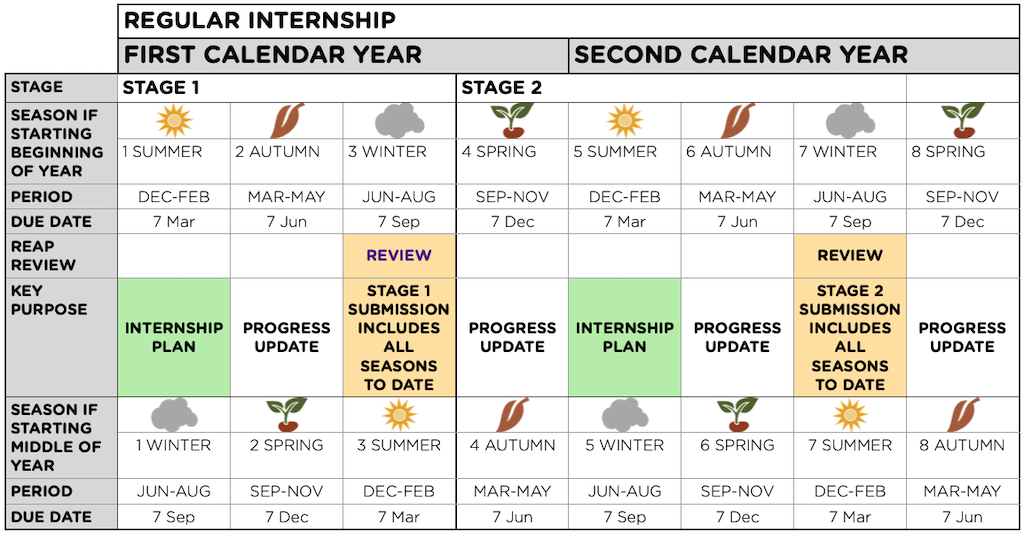
FIGURE 7. TIMELINE FOR P2 CONCURRENT-STUDY AND P3 INDIVIDUALISED PATHWAYS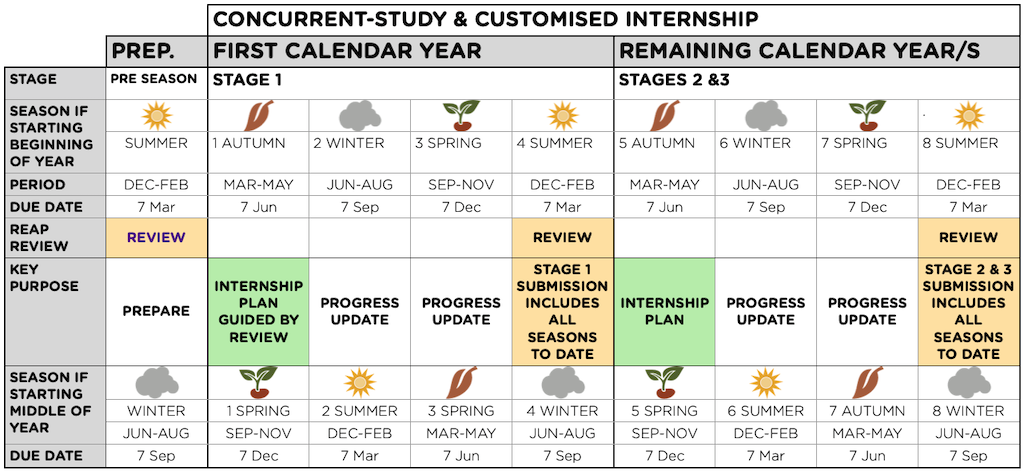
PROGRESSION PROCESS FOLLOWING PROGRESSION SUBMISSIONS
Your Supervisor’s report, along with your Ministry Report and Competency Review provides a comprehensive picture of your Internship journey to date, allowing your Conference team to evaluate your suitability for progression. You will be invited to take part in an Evaluation Conversation which has three main aims:
- To look at the broader picture of your ministry and what God is doing in your life.
- To provide an evaluation of your ministry as shared in the ministry reports.
- To provide an evaluation discussion around your Competency Review.If your Conference team is satisfied that you have completed the requirements for the relevant stage of your Pathway, they will submit your name to the President’s Council/AUC Board of Directors for approval.Beyond Internship, a similar process will take place as you move toward ordination/commissioning and beyond.
LICENSED MINISTRY
 On completion of your Internship, you will normally be granted either a Commissioned Ministry Licence or a Ministry Licence.
On completion of your Internship, you will normally be granted either a Commissioned Ministry Licence or a Ministry Licence.
As a licensed minister, your ministry development will continue according to the Ministry Leader’s Handbook, utilising seasonal ministry reports, and an annual REAP cycle to guide and shape your journey as explained in the Ministry Leader’s Handbook.*
The annual Review and Evaluation Conversation, integral to this cycle, is a valuable opportunity to explore strengths and challenge areas as you seek to further develop in ministry. This conversation also provides an opportunity for Administration to give consideration to your ministry progression.
*For more information relating to the REAP Cycle, refer to pp. 40-43 in the Ministry Leader’s Handbook.
ORDINATION AND COMMISSIONING
 Ordination and Commissioning to the ministry involve the setting apart of eligible employees to the sacred calling of gospel ministry. Ordination and Commissioning are preceded by wide counsel and rigorous examination. Ordination and Commissioning are outlined in Appendix D, ‘SPD Policy Min.10.25 Ordination & Commissioning to the Gospel Ministry’.
Ordination and Commissioning to the ministry involve the setting apart of eligible employees to the sacred calling of gospel ministry. Ordination and Commissioning are preceded by wide counsel and rigorous examination. Ordination and Commissioning are outlined in Appendix D, ‘SPD Policy Min.10.25 Ordination & Commissioning to the Gospel Ministry’.
Suitability for progression to ordained/commissioned ministry is assessed according to the criteria summarised in Table 1: Requirements for Ministry Progression. At each annual Evaluation Conversation, your Conference team will discuss with you what they see as your strengths, and explore with you any challenge areas that you will seek to improve in the coming year.
Following the Evaluation Conversation in your third year of Licensed Ministry, your Conference team will let you know if they have decided to put your name forward to the AUC for consideration for ordination/commissioning.
At this time, they will ask you to participate in a Ministry Progression Interview, which in itself is an affirmation of your ministry. It is helpful to be aware that there are often a number of Ministry Progression Interviews before the ordination/commissioning process is initiated. Your spouse will always be invited to these interviews and it is greatly encouraged and appreciated when they are able to attend. This Ministry Progression Interview is also usually attended by Conference Administration, your Ministerial Secretary, your Supervisor and, where possible, your Union Ministerial Association Secretary. Subsequent progression interviews may take place as part of REAP cycle conversations with your Conference Administrative team.
Your Conference may submit names for consideration for ordination/commissioning twice a year. This is usually in March and September, ahead of Presidents’ Council and Union Executive meetings. The Summer Ministry Report (due end February) and the Winter Ministry Report (due end August) are the seasons when Internship submissions are made.
When your Conference team initiates this process, they will take great care to thoroughly examine your ministry to ensure that you are ready for this process.
Your Conference team may recommend your name to the Conference Executive who will review your submission. If approved, your Conference Executive will recommend your submission to the AUC, where it is first reviewed by the Presidents’ Council, before being presented to the AUC Board of Directors for approval.
Once approved, your Admin team/Ministerial Association Secretary will inform you of this step, and will begin planning your ordination/commissioning service with you.
If ordination/commissioning is to be delayed, you will be made aware of the reasons why.
CHARGE FOR ORDAINED/ COMMISSIONED MINISTERS
CONDENSED VERSION*
God has called you to the work of pastoral ministry, and the church, in recognising that call, has set you aside by the laying on of hands today. Your ordination/commissioning is recognised by the Adventist church world-wide. Such honour involves great responsibility.
I charge you to minister as a servant, remain humble and teachable and make the Master your lifelong study. By spending time with Jesus, you will become like Him. It is by beholding what we become changed.
“Be an example to the believers in word, in conduct, in love, in spirit, in faith, in purity.”
I charge you to minister as a shepherd. Jesus said: “I am the Good Shepherd. The Good Shepherd gives His life for the sheep.”
I charge you to minister as a watchman. “Preach the word. Be ready in season and out of season. Convince, rebuke, exhort, with all long-suffering and teaching … But you be watchful in all things, endure afflictions, do the work of an evangelist, fulfil the ministry God has called you to.”
I charge you to minister as a teacher. “Nourish people in the words of faith and in good doctrine which you have carefully followed”, “Feed the church of God, which he hath purchased with his own blood.”
And when your work is ended, may you say with Paul, “I have fought the good fight, I have finished the race, I have kept the faith. Finally, there is laid up for me the crown of righteousness, which the Lord, the righteous Judge, will give to me on that Day, and not to me only but also to all who have loved his appearing.”
Amen
APPENDIX D
Examination of Candidates for Ordination Commissioning GC WORKING POLICY L 50
Before any ordination is carried out, there shall be careful, unhurried, and prayerful examination of the candidates as to their fitness for the work of the ministry by the ministerial committee. The results of their labour as licentiates should be reviewed, and the examination should cover the great fundamental facts of the gospel. Before the Church sets a minister apart for world-wide service by ordination or commissioning, he or she should have given satisfactory evidence of the personal qualities, knowledge, commitment, and skills outlined below:
1. Personal qualities:
a. An experience of conversion lived out in a transformed and whole-hearted following of Christ, a humble rejoicing in the forgiveness and love of God, and a life of obedience, witness and consecration of the total being through the Holy Spirit’s power.
b. An Adventist identity grounded in a biblically-informed worldview and centred in a clear biblically-based understanding of the gospel of Jesus Christ in the framework of the story of the great controversy from Eden lost to Eden soon to be restored. Such an identity will be evident in personal life, service, and mission.
c. An active love for people flowing out of the unconditional love of God, and resulting in a life of respect, compassion, service and witness to others, regardless of age, gender, ethnicity, religion, nationality, personality, or socio-economic status. An important aspect of this love is the exemplary care and faithfulness given to one’s own family and living a virtuous life.
d. Emotional, spiritual, and social stability and maturity grounded in the health of one’s mind, body and spirit, and evidenced in humility, balanced judgment, personal conduct, integrity and professional ethics guided by biblical principles, and personal financial stewardship in tithes and offerings.
e. A sense of divine calling to lifelong gospel ministry, affirmed by the Church, and resulting in a passion to save the lost which orients one’s life for diligent service and mission in the context of the Three Angels’ Messages of Revelation 14.
2. Knowledgeable of and committed to:
a. God—Father, Son, and Holy Spirit—as Creator and Redeemer and as the initiator of the personal and primary relationship with Him around which one’s life and ministry unfolds.
b. God’s Word as the essential authoritative source and guide for gospel teaching, life, and ministry.
c. The Message, Organisation, and Fellowship of the Seventh- day Adventist Church expressed in the Seventh-day Adventist Fundamental Beliefs, the Church Manual, the Minister’s Handbook, and borne out in the active support of the Seventh-day Adventist Church and its institutions worldwide.
d. Participation in God’s Redemptive Mission of reconciling the world to Himself, by embodying and proclaiming the saving gospel of Jesus Christ through the cultivation of the fruits and the gifts of the Spirit.
e. Church Principles as voted in the Church Manual.
3. Skilled in:
a. Studying and faithfully interpreting Scripture in order to discern God’s message.
b. Imparting a thorough and practical understanding of the eternal gospel and the hope of salvation, and all the teachings of Scripture, by preaching, teaching, healing, and preparing people for the soon coming of Jesus Christ.
c. Leading people to Christ in baptism and discipling individuals into a growing relationship with Jesus Christ by nurturing, training, and mentoring into active membership in the Seventh-day Adventist Church.
d. Leading Churches in becoming healthy, growing faith and worship communities through effective servant leadership that models and nurtures love and respect for every individual, care for the diverse families and groups within the community of believers, and manages resources wisely in order to offer joyful and honouring lives and witness for God.
e. Training and Involving Members in God’s Mission by helping them recognise God’s call and gifting in their lives for particular areas of service, and by fostering the development of these gifts for ministry in the Church and in the community according to the model of Jesus.
NOTE: A parallel policy is found in SPD Working policy 10.25 Ordination and Commissioning to the Gospel Ministry
APPENDIX E – GLOSSARY
Accountability Partner – a person of your choosing to help you with spiritual, relational and personal accountability. Criteria and more info in Ministry Leaders’ Handbook pp. 19-20.
Auxano – the Greek work meaning ‘to cause to grow’.
Auxano Plan – a growth plan within the MD portal, which can be imported into part 1B of the Seasonal Ministry Report (MLH p. 43).
Auxano Planning Library – the MD portal’s library which contains resources for ministry development, from which an Auxano plan is created.
Auxano Planning Tool – the interface that facilitates the creation of an Auxano Plan using resources from the Auxano Library.
Competency Review Report – also known simply as a Review, this is the first phase of the REAP Cycle, facilitated through the MD portal, designed to give the Ministry Leader useful feedback on perceived personal and ministry strengths and challenge areas (MLH p. 43).
Concurrent-Study Intern – Concurrent Internship is a trial period of supervised apprenticeship (or coaching) in ministry, to be completed in conjunction with recognised theological education (pp. 12-13.) (see also ‘Pathway 2 Intern’ and ‘Intern’)
Individualised Intern – see Pathway 3 Intern (see definition of ‘Intern’).
Evaluation Conversation/Interview – a conversation between a Ministry Leader and a member of the conference admin or ministerial team, affirming strengths and identifying possible challenge areas for future growth (MLH p. 43).
Intern – a Ministry Leader, employed 12 months at a time, who is growing in ministry competency and effectiveness under the supervision of an Intern-Supervisor. For the simplicity of convention in this Manual only, the word Intern has been used to describe those on P1, P2 and P3. In fact P1 are the only Interns, with P2 representing a Concurrent-study pathway, and P3 representing an Individualised Pathway.
Ministry Development Meeting (MDM) – a weekly meeting between the Intern and Intern- Supervisor for the express purpose of the Intern’s development.
Local Supervisor – an appointed Intern-Supervisor who is geographically close to their Intern.
Ministry Development Framework (MD) – A framework designed by Ministry Leaders for Ministry Leaders to assist with personal accountability, ministry development, communication and leadership at every level of the Church.
Ministry Report – see Seasonal Ministry Report.
Ordination – the setting apart of an eligible employee to the sacred calling of gospel ministry for the world church.
Pathway 1 – Regular Internship Pathway (see pp. 10-11). Pathway 2 – Concurrent-Study Pathway (see pp. 12-14). Pathway 3 – Individualised Pathway (see pp. 15-19).
REAP Cycle – an annual cycle of Ministry Development designed to empower Ministry Leaders for growth (MLH pp. 40-43).
Recognised Theological Study/Qualifications – Theological study/qualifications that are recognised by the AUC (Avondale University College B.A. or equivalent), or Mamarapha, Certificate 4.
Remote Supervisor – an appointed Intern-Supervisor who is not geographically close to their Intern and provides supervision remotely.
Seasonal Ministry Report – A Ministry Report submitted at the end of Summer, Autumn, Winter and Spring (Terms 1, 2, 3, 4 for chaplains). (See MLH pp. 44-45.)
Union-appointed Ministerial Secretary – a person appointed by the AUC to moderate the REAP cycle for Individualised Interns.



